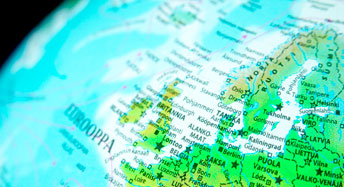Minister of Education wants to increase internationality in schools

In future, there is more internationality in schools, children start learning languages earlier and everyone can go on student exchange, Minister of Education Sanni Grahn-Laasonen outlines her vision.
Minister Grahn-Laasonen says that Finland should set concrete objectives for the promotion of internationality and equal opportunities to international experiences.
“We live in a world where networks of global contacts are ever growing and where international interaction is already now one of our basic skills,” Grahn-Laasonen explains.
There are at least four ways to promote internationality in education, according to Grahn-Laasonen.
First, there should be more variety in language learning. Children should also start learning foreign languages earlier than they do now, in the first school year or already in early childhood education.
Secondly, each higher education degree should include an element of international experiences, either through studies abroad or at home through the educational institution’s international contacts.
Grahn-Laasonen would also expand the opportunities for student exchange and school trips abroad in upper secondary education as well as in comprehensive school so that all students, irrespective of their families’ income, could get international experiences.
The fourth way to promote internationality in education is to make teacher education more international and to give teachers more opportunities to international mobility and experiences.
Universal access to international contacts
Grahn-Laasonen says that it is important to increase the opportunities to international experiences also because the world is getting polarised even in terms of young people’s experiences and opportunities.
“While some young people are born into a global environment and they get to travel and see the world and study abroad, there are others – children, young people, families, regions and schools – who have less international experiences. Even those young people, who do not get support, funding or encouragement from their families, should have access to international experiences,” Grahn-Laasonen says.
With emerging nationalism, we must be brave and expand young people’s views and encourage them to learn international cooperation and cultural interaction.
For individuals, international experiences could open doors to employment in later life.
Internationalisation integrated into higher education and upper secondary levels
“Each higher education degree should include an element of international experiences, either through studies abroad or through the educational institution’s international contacts. This objective was included in the international strategy for higher education and research, compiled in collaboration between the Ministry of Education and Culture and higher education institutions. My hope is that also students in the upper secondary level will have the same opportunity,” the Minister says.
One in eight Finnish students in vocational education takes part in international mobility programmes, a top figure in European comparison.
“I hope that by expanding the opportunities to international experiences we can get an even bigger advantage compared to other European countries. The more individualised study paths, introduced as part of the reform of vocational education and training, would create more opportunities to studies and internships abroad as well as to other forms of international experience,” the Minister estimates.
The Government has decided to initiate a reform of general upper secondary education. In future, each student in upper secondary school will gain international experiences in some form or other,” the Minister outlines.
Learning languages is the key to international experiences
The Minister says that internationalisation promotes language learning, and vice versa. Children and young people should be encouraged to learn languages in more versatile ways.
“Starting next autumn, one in four municipalities in Finland will provide children the opportunity to start learning a foreign language already in the first school year or in early childhood education. The aim is to give more children and families opportunities to early learning of languages and to motive them to choose to study different languages even later on,” Grahn-Laasonen says.
“We have now more research and understanding of the significance and opportunities of early language learning. We should pay more attention to the sensitive periods for learning languages. Children could learn languages through play already in early childhood education.”
– –
Minister of Education Sanni Grahn-Laasonen has appointed Professor Riitta Pyykkö from the University of Turku to prepare proposals for developing language teaching at all levels of education. Professor Pyykkö will complete her report by the end of 2017.
The Ministry of Education and Culture has launched a regional experiment whereby language studies start in the first year of school or already in early childhood education and care. The experiment will also broaden the range of languages available for study. Altogether 76 municipalities and 19 other education providers have been granted special discretionary government transfers for the experiment. Based on the project plans the experiment will reach as many as 69,000 children in comprehensive school, 8,000 in preschool education and 7,000 children in early childhood education.
The working group preparing proposals for developing the matriculation examination proposed in its report in April that the matriculation examination should be organised so that it encourages students to study several languages. The working group also proposed the introduction of oral examinations.
Inquiries:
Henrik Vuornos, Special Adviser to the Minister of Education (media relations), tel. +358 44 243 4444

